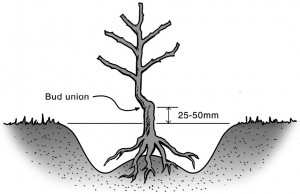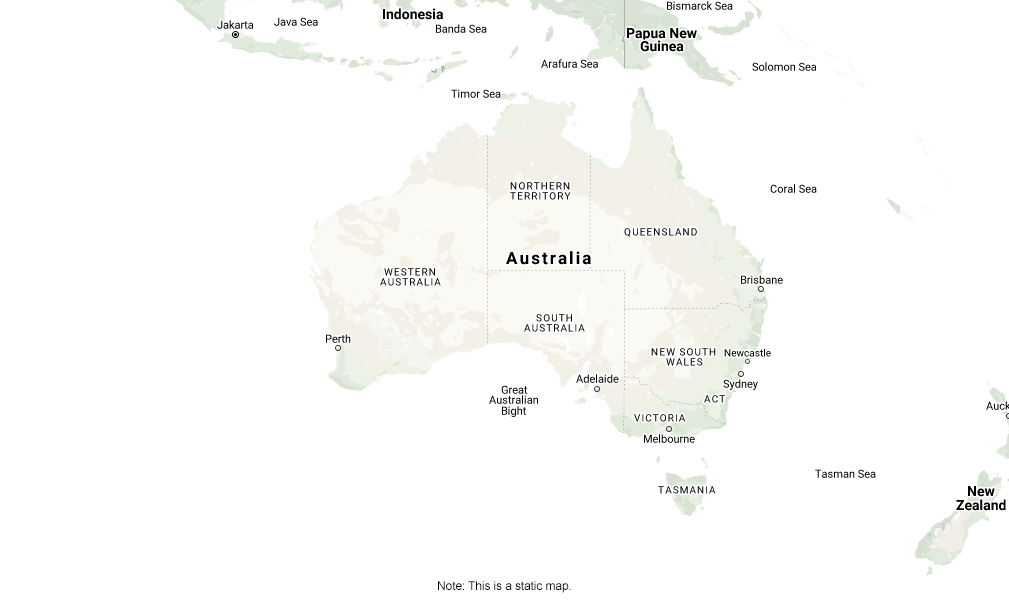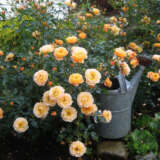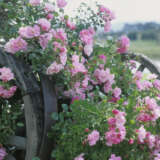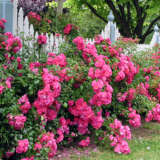Rose Flower Carpet Coral
100mm Pot
Producing a profusion of small coral pink flowers on a low growing spreading Rose, Flower Carpet Rose Coral (Rosa hybrid) is a genuinely easy care rose. The disease resistant glossy green foliage creates the perfect backdrop for a true low maintenance feature rose that is rarely without flowers, at any time of the year.
Once established, Flower Carpet Roses are extraordinarily low maintenance and have exceptional disease resistance and their well-developed root system means they’re drought and frost tolerant.
Pruning Flower Carpet Roses is optional: at the most they need a hard prune once a year, usually in winter. Grab a pair of garden shears to cut them back by a third any which way. Even without pruning Flower Carpet roses will still flower prolifically on a slightly larger bush.
Supplied as a potted plant.
Important Reminder: While we take great care in the realistic representation of our products, many variables such as climatic conditions, natural variation or manufacturing changes may affect the precise appearance of each variety. Generally, images used are of mature specimens whilst supplied stock may be dormant or juvenile plants that will develop with time. The images are intended as a guide only.
- Suitable for areas with full sun
- Suitable for areas with part shade
- Ideal in pots or containers
- Suitable to cut for vases
- Grows 1m wide
- Grows to 1m high
- Early Spring-Winter
- Ideal Growing Regions:
 Cool
Cool Temperate
Temperate Arid
Arid Semi-arid
Semi-arid Mild Tropical
Mild Tropical- View growing regions on the Climate Map
Availability: OUT OF STOCK/OUT OF SEASON! Available to order, unless sold out.
$22.90
Out of stock
Send me an email when this item is back in stock.
Money-Back Guarantee
 GUARANTEE & RETURNS:
GUARANTEE & RETURNS:
At Garden Express, we want to ensure that you have a positive purchasing experience. On the off chance your plants get stuck in the mail or haven’t arrived in the best condition, we ask that you reach out to us promptly with any concerns or issues. You can contact us via email at [email protected] or by phone at 1300 606 242, Monday to Friday EST, contacting us through social media platforms may be less reliable, so we encourage you to use our email.
Please note that it’s important to get in touch with our customer service team within 7 days of receiving your order if you have any concerns as claims regarding arrival condition after 7 days of arrival will not be recognised.
Please also remember not to dispose of any items until you’ve spoken to us, as to be eligible for a replacement, credit, or refund, we may request photos or additional information for any item(s) in question.
If you need to make a return, please contact our Customer Service department via email at [email protected] or by phone at 1300 606 242 for authorisation before proceeding. Once again contacting us through social media platforms may be less reliable, so we encourage you to use our email or phone number for a smoother experience.
It is also important to mention that discounted ‘end-of-season’ stock is sold on an ‘as is’ basis and is exempt from this guarantee. While this stock is generally sound, we recommend planting these items as soon as possible.
Our team packs and dispatches each day based on the best timing of delivery service to your state. This way we can ensure your order is in transit for the shortest time possible.
Delivery is normally via Australia Post with larger orders delivered via StarTrack Express* courier. We service virtually all areas of Australia with only those areas not serviced by these organisations being excluded (e.g. remote islands and Territories such as Christmas Island, Lord Howe Island, Norfolk Island, Cocos Islands, Groote Eylandt). We do not deliver outside Australia but happily deliver orders placed from overseas for Australian delivery. Our regular delivery charge for basic items is $12.50 Australia-wide, regardless of the number of items ordered. Due to their higher freight costs, bulky or heavy products such as roses, large pots and a small number of hard goods have higher delivery charges. The summary of all current delivery options is:
- Basic Postage $12.50: Applies to orders NOT containing Roses, 120mm and larger pots/grow-bags, Bare-rooted Trees, Composting Buckets, nor any items with individually specified delivery charges, all delivered at one time, will incur the normal $12.50 freight charge. These items are referred to as “Basic Items“.
- Roses & Larger Potted Items $16.90: Applies to orders containing bush Roses, 120mm up to 155mm pot/grow-bags, Composting Buckets, together with other products delivered at the same time will incur a $16.90 freight charge. **Please Note: Multiples of these items may incur a larger freight fee depending on the quantity of pots in the order; this will be calculated at the checkout.
- Small Trees & Large Pots $25.50: Applies to orders containing Trixie Fruit Trees, Dwarf Fruit Trees, Lilac Trees, Standard and/or Patio Roses, 160mm up to a 200mm pot/grow-bags, together with other products delivered at the same time will incur a $25.50 freight charge. **Please Note: Multiples of these items may incur a larger freight fee depending on the quantity of pots in the order; this will be calculated at the checkout.
- Trees up to 1m $35.00: Applies to orders containing smaller bare-rooted trees up to 1m in height. Larger items or pots/grow-bags greater than 200mm, together with other products delivered at the same time, will incur a $35.00 freight charge. Remote areas may incur an additional Freight charge but we will notify customers individually if this is the case. **Please Note: Multiples of these items may incur a larger freight fee depending on the sizes and quantity of items in the order; this will be calculated at the checkout.
- Trees 1m up to 1.49m $50.00: Applies to orders containing bare-rooted trees between 1 to 1.49m in height. Bare Rooted trees 1m to 1.5m in height, together with other products delivered at the same time, will incur a $50.00 freight charge. Remote areas may incur an additional Freight charge but we will notify customers individually if this is the case. **Please Note: Multiples of these items may incur a larger freight fee depending on the sizes and quantity of items in the order; this will be calculated at the checkout.
- Trees 1.5m up to 2m $85.00: Applies to orders containing bare-rooted trees between 1.5 to 2m in height. Bare Rooted trees 1.5m to 2m in height, together with other products delivered at the same time, will incur a $85.00 charge. This consists of $65.00 Freight Fee and $20 Oversize Surcharge, as charged by the Courier. Remote areas may incur an additional Freight charge but we will notify customers individually if this is the case. **Please Note: Multiples of these items may incur a larger freight fee depending on the sizes and quantity of items in the order; this will be calculated at the checkout.
- Trees 2m up to 3m $135.00: Applies to orders containing bare-rooted trees between 2 to 3m in height. Bare Rooted trees 2m to 3m in height, together with other products delivered at the same time, will incur a $135.00 charge. This consists of $95.00 Freight Fee and $40 Oversize Surcharge, as charged by the Courier. Remote areas may incur an additional Freight charge but we will notify customers individually if this is the case. **Please Note: Multiples of these items may incur a larger freight fee depending on the sizes and quantity of items in the order; this will be calculated at the checkout.
- Orders containing products with explicitly stated delivery charges will incur charges as detailed in the individual product description.
- Express Post: If you require your order to be sent Express Post, please call our office and we will arrange a quote. Please Note: Quarantine orders cannot be sent using Express Post; our experience is that it will actually delay your order due to the inspection process required for entry into these states.
- Order Split Fee: Some items may be delayed due to climatic or growing habits prevent them from being harvested at the time of being offered for purchase. You will be offered a choice to wait until all items on your order are available or to receive what is currently available for an additional freight charge of $5.00.
- We continue to maintain the simplest form of postage costs for the large variety of products we range, however in occasional circumstances of oversized orders and/or delivery location, the cost of freight can significantly impact delivery of an order therefore we reserve the right to refuse the order or contact the customer to discuss freight options and pricing.
Orders containing products from two different seasons (eg Rose or spring bulb pre-orders) that require separate deliveries will incur two delivery charges at the relevant rates (unless a free freight offer applies). A $5.00 Quarantine Inspection Surcharge applies in addition to the Delivery Charge for orders delivered to Tasmania, Northern Territory and Western Australia due to the increased complexity of quarantine requirements.
As quarantine inspections apply to each delivery, 2 quarantine charges will apply where orders contain products from different seasons. *Please note that if you order large items (eg Patio, Standard or Weeping Roses, Fruit Trees) you must specify a street address for the delivery address. StarTrack Express generally do not deliver to PO Boxes or RSD addresses so your order will be held until a suitable address is obtained. In rural areas, StarTrack may deliver to physical addresses such as general stores that act as Australia Post agencies but we suggest you check with them first. Where ”Free Delivery” vouchers apply to an order, details of the voucher should be entered in the “Your message to us” field. Orders (except Pre-orders) are normally despatched within 7-14 working days from the time of ordering during busy periods. Delivery times may be extended during peak periods (typically following the release of the latest catalogue), extended public holidays, if extreme weather conditions are not suitable for live plant transport or as detailed in the product description.
Individual items may be back-ordered to avoid delaying the delivery of other items. Please allow additional delivery time for orders to Tasmania, Northern Territory and Western Australia due to quarantine restrictions.
Please note: Some orders may not be possible to parts of Australia due to quarantine and some items may carry unique delivery charges. Check full delivery policy.
ROSES GENERAL CARE
Summary
- Select a sunny aspect well clear of existing trees and shrubs
- Prepare the garden bed in well drained soil
- Do not use fertiliser when planting
- Do not let the roots dry out at anytime after opening your rose package
- Plant with all roots going downwards & outwards
- Water in well after planting.
- Re-prune the branches to a good growth eye if necessary.
The enclosed bare-root roses have been packed with care and should arrive to you in good condition. All the roses sold by Garden Express are bud grafted. They are supplied as bare root plants when dormant during the winter months. After roses are dug the roots are washed free of soil prior to packing and transport. Bare root roses travel extremely well and should remain fresh in transit for up to two weeks.
When your plants arrive:
Step 1. Undo the parcel carefully and soak the roots in water overnight.
Step 2. Plant the following day (as per planting instructions & diagram), do not let roots dry out.
Step 3. If the plants arrive in advance of your desired planting time they should be heeled-in*.
*To keep bare rooted roses longer than 3 days they should be “heeled-in”. Select an open space in the garden, dig one large hole and plant all your bundled roses in it and firm down soil. Water in well. They will keep for several weeks if kept watered.
*Note: It is important not to let the roots dry out at any stage of planting.
Choosing the right position – All roses require an open, sunny and well drained position. At least 5 hours sun per day is required, preferably more. Although shaded areas will allow roses to do well, the quantity of flowers will reduce with the percentage of shade. Shaded parts of the garden are more liable to attacks from fungus diseases as the plants remain wet for too long after rains or dewy nights. Protection from wind is essential for good blooms but remember to allow for movement of air. Avoid planting too close to established shrubs and trees.
Soil preparation Ideal soils are not available to everyone, but roses are very adaptable with some help from the gardener. Best soils are medium to heavy loam to about 35cm minimum depth, over a good clay subsoil. However roses can be grown successfully in many soil types. The important thing to remember is that light sandy soils retain less moisture and nutrients. Light sandy soils require copious quantities of compost and animal manures, as well as more frequent watering. Mulching is advisable with all soil types as it eliminates many problems, such as less watering and weeding and also retains better average soil temperature. Some mulches to use: Pea straw, lucerne, tan or pine bark, leaf mould, peat moss, and horse or cow manure.
DO NOT – use fowl manure or other quick soluble fertilisers at planting time.
DO NOT – replant into old soil where roses have been removed. Renew with fresh soil.
DO NOT – use weedicides or pre-emergence weedicides. (Roundup™ type weed killers can be used to clean an area prior to planting).
Sucker Growth – Most rose plants are budded onto “root-stocks”. Occasionally a shoot from the root stock grows and is known as a “sucker”. It will come from below the graft and the foliage will look distinctly different. This growth must be removed immediately, as it grows quite vigorously and will completely take over the plant. To remove sucker growth, first find where it originates. This may be on the main stem or from a root below ground. Take a sharp knife and remove the growth completely. Do not use secatures and do not cut off growth at ground level. DO NOT confuse water shoots with suckers. Water shoots ALWAYS come above the graft.
Dead heading – Regularly removing old flowers (dead heading) will encourage the production of more flowers throughout all of the warmer months.
How to plant – The ideal time for planting bare root roses in Australia is June and July. Later planting is possible, depending upon climate, but generous watering will be necessary until the plants have full foliage. The proposed rose bed should have been dug over many times prior to planting and brought to a good tilth, ready for the plants. A thorough cultivation at the time of planting is a bare minimum. Dig a hole large enough to take the roots, which should be placed down and outwards over a small mound at the bottom of the hole. A hole approximately 30cm wide by 25cm deep should be sufficient. Cover with soil and firm down moderately. Water in well. The bud graft or bud union should remain approximately 5cm above soil level. Do not use fertilisers at planting time, as this may burn the roots. However, the addition of well rotted animal manure and a small amount of blood and bone well dug in is beneficial.
The following can be used as a guide for spacing your plants:
Hybrid Tea Bush – Average 1 – 1.3 metre apart
Floribunda Bush – Average 0.6 – 1 metre apart
Ground Covers – Average 1 metre apart
In most circumstances the graft or bud union of all bush roses should remain approximately 5cm above soil level.
Water in well and firm moderately.
Twin Coloured Roses – Twin color roses need specific care. In order for these roses to reach their full potential, it is important that the more vigorous color is managed to allow the other color to grow and flourish. As these plants are growing, please ensure equal growth from both colours by cutting back the white flowering stems a little harder than the other colour rose. This will ensure that the more vigorous color will not overtake and crowd out the second colour of these lovely plants.
Pests and diseases – With most diseases of roses, prevention is the best cure. Most diseases can be prevented but not always cured. While it would be desirable to grow roses without spraying, they do need treating to retain good health and vitality and consequently better quality flowers. Fungus diseases such as black spot and mildew are more prevalent in the humid areas of Australia.
The following suggestions are what we have found to be most satisfactory.
Black Spot – Probably the most troublesome disease because if left unattended the plant will become defoliated and consequently lose vigour and become debilitated. It is important to remember that Black Spot cannot be cured, so a preventive spraying program is necessary. Immediately after Winter pruning spray the roses and surrounding ground with Bordeaux or Lime Sulphur, this helps eradicate any fungus spores left on the pruned plant. In early spring, when good growth commences, start spraying thoroughly every 10 days. The following fungacide sprays are considered effective: Triforine (Saprol), Mancozeb, Dithane M45, Baycor, Systhane. A good organic control for fungal infections is 1 part full cream milk to 10 parts water and sprayed onto foliage every 7 to 14 days.
Mildew – Mainly effects the young growth and is usually at its worst in sub-tropical areas where night air is cool and dews are prevalent. Spray every 10 days or when necessary with Nimrod, Triforine (Saprol), or Rubigan. For both Black Spot and Powdery Mildew avoid watering roses overhead in the late afternoon or evening, as night dampness is conducive to the spread of fungus diseases.
Rust – Appears as rust coloured spots or swellings on the underside of leaves and occasionally on the stems. Not very common, but if noticed spray the undersides of leaves with Rubigan, Triforine, or Zineb.
Insects – Aphids, two spotted mite (Red spider mite) and other sucking insects can be controlled with the following: Rogor, Metasystox, Mavrik, Torgue. These are all systemic sprays, rotate usage to avoid insects becoming partly immune.
Caterpillars & Chewing Pests- Can be eradicated using Cabaryl Septene) or Bugmaster (Sevin).
IMPORTANT NOTE: All the above sprays should be used strictly in accordance with directions on labels and compatibility investigated if using more than one at a time. Use protective clothing for safety and do not spray when temperature is above 25C. Always store chemicals well out of reach of children.
Legend
Establish which coloured region you live in and then consider the varieties listed as typically suited to that area. The Australian Climate Guide map is intended as a guide only as climatic conditions vary between specific locations. Factors such as local altitude, wind and the proximity of hills, mountains and bodies of water can cause variations from the generalised climate map. Note also that although a plant may be listed as suitable for a particular region, it may still require protection from extremes such as frost or strong winds. You should also consider its requirements for sun, shade and water.
Remember that you can often extend the range of plants that you can grow by creating micro-climates within your garden. Planting under trees, beside brick walls or in the shelter of a building, on high or low points in the garden can all have an effect. Even planting by a pond or surrounded by rocks can be used to advantage. Part of the joy of gardening can be experimenting and nothing is more pleasing that achieving success with a plant that is not usually seen in your area.
The map is based on Australian Bureau of Meteorology 30 year climatology data from 1961-1990. The zones are based on both temperature and humidity:
 Tropical – hot humid summer .
Tropical – hot humid summer . Mild Tropical – warm humid summer
Mild Tropical – warm humid summer Semi-arid – hot dry summer, cold winter
Semi-arid – hot dry summer, cold winter Arid – hot dry summer, cold winter
Arid – hot dry summer, cold winter Temperate – warm summer, cool winter
Temperate – warm summer, cool winter Cool – mild-warm summer, cool winter
Cool – mild-warm summer, cool winter
Looks great in the garden with...
-

Rose Golden Touch (PBR)
Bare Root Rose $36.90 Sold/Out of Season -

Rose Flower Carpet Amber (PBR)
100mm Pot $22.90 Sold/Out of Season -
Sale!

Rose Flower Carpet Appleblossom
100mm Pot$22.90Original price was: $22.90.$17.90Current price is: $17.90. Buy Now -
Sale!

Rose Flower Carpet Pink
100mm Pot$22.90Original price was: $22.90.$17.90Current price is: $17.90. Sold/Out of Season



 Cool
Cool Temperate
Temperate Arid
Arid Semi-arid
Semi-arid Mild Tropical
Mild Tropical